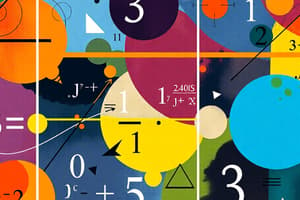Podcast
Questions and Answers
What role does mathematics play in early civilizations?
What role does mathematics play in early civilizations?
- It was primarily used for artistic expression.
- It was used to enhance political strategies.
- It served only in religious rituals.
- It was employed for agriculture, trade, and construction. (correct)
Which of the following best describes a usage of mathematical modeling?
Which of the following best describes a usage of mathematical modeling?
- Writing literary critiques.
- Creating art for aesthetic purposes.
- Developing musical theories.
- Simulating results for market trends. (correct)
Which technique is commonly used to visualize data?
Which technique is commonly used to visualize data?
- Graphs, tables, and diagrams. (correct)
- Statistical analysis.
- Three-dimensional modeling.
- Narrative storytelling.
What was a major achievement of ancient civilizations in mathematics?
What was a major achievement of ancient civilizations in mathematics?
Which area focuses on risk assessment and investment strategies?
Which area focuses on risk assessment and investment strategies?
Which branch of mathematics focuses on continuous change and rates of change?
Which branch of mathematics focuses on continuous change and rates of change?
What do sets in mathematics represent?
What do sets in mathematics represent?
Which of the following is NOT a fundamental operation in arithmetic?
Which of the following is NOT a fundamental operation in arithmetic?
What is required for a set to be classified as a field in mathematics?
What is required for a set to be classified as a field in mathematics?
Which branch of mathematics studies the properties of prime numbers and divisibility?
Which branch of mathematics studies the properties of prime numbers and divisibility?
What does a function represent in mathematics?
What does a function represent in mathematics?
In which branch of mathematics do we analyze and present numerical data?
In which branch of mathematics do we analyze and present numerical data?
What is a fundamental step in problem solving in mathematics?
What is a fundamental step in problem solving in mathematics?
Flashcards
Algorithm
Algorithm
A set of steps to solve a problem.
Market Trend
Market Trend
A pattern in how markets change over time.
Risk Assessment
Risk Assessment
Estimating potential financial losses.
Mathematical Modeling
Mathematical Modeling
Signup and view all the flashcards
Data Structures
Data Structures
Signup and view all the flashcards
Mathematics
Mathematics
Signup and view all the flashcards
Arithmetic
Arithmetic
Signup and view all the flashcards
Algebra
Algebra
Signup and view all the flashcards
Functions
Functions
Signup and view all the flashcards
Sets
Sets
Signup and view all the flashcards
Problem Solving
Problem Solving
Signup and view all the flashcards
Logic
Logic
Signup and view all the flashcards
Proof
Proof
Signup and view all the flashcards
Study Notes
Introduction to Mathematics
- Mathematics is a fundamental field of study encompassing the study of quantity, structure, space, and change.
- It involves the use of symbolic language and logical reasoning to explore and quantify relationships.
- Its applications are vast, impacting numerous fields such as science, engineering, technology, and economics.
Branches of Mathematics
- Arithmetic: Deals with the basic operations of numbers (addition, subtraction, multiplication, division).
- Algebra: Uses symbols and variables to represent unknown quantities and solve equations.
- Geometry: Studies shapes, sizes, positions, and properties of space.
- Calculus: Focuses on continuous change and rates of change, utilizing derivatives and integrals.
- Trigonometry: Deals with relationships between angles and sides of triangles.
- Number Theory: Studies the properties of numbers, such as prime numbers and divisibility.
- Discrete Mathematics: Concerned with finite or countable sets, graphs, and logical reasoning.
- Statistics: Involves collecting, analyzing, interpreting, and presenting numerical data.
- Probability: Studies the likelihood of events occurring.
Fundamental Concepts
- Sets: Collections of objects.
- Operations: Mathematical procedures like addition, subtraction, multiplication, and division.
- Relations: Connections between sets or elements.
- Functions: Specific types of relations where each input has a unique output.
- Logic: A system of reasoning using statements and arguments.
- Proof: A demonstration of the truth of a statement or theorem using logical steps.
Key Mathematical Structures
- Groups: Sets with a binary operation satisfying specific axioms (closure, associativity, identity, inverse).
- Rings: Sets equipped with two operations (addition and multiplication) satisfying certain axioms.
- Fields: A special type of ring where multiplication is commutative and every non-zero element has a multiplicative inverse.
- Vector Spaces: A collection of objects called vectors, with operations of addition and scalar multiplication.
Problem Solving
- Understanding the problem is crucial.
- Develop a plan or strategy to solve the problem.
- Execute the plan systematically.
- Check the solution obtained and verify its correctness.
- Generalizing the solution process to similar problems.
Applications of Mathematics
- Science: Modeling physical phenomena, predicting behavior.
- Engineering: Design and analysis of structures and systems.
- Computer Science: Algorithms, data structures, and artificial intelligence.
- Economics: Analyzing market trends, optimizing resources.
- Finance: Risk assessment, investment strategies.
Mathematical Tools and Techniques
- Various softwares and platforms assist in numerical computation.
- Mathematical modeling and simulation tools are employed in analyses and problem-solving.
- Different techniques such as graphs, tables, diagrams help in visualization and understanding.
History of Mathematics
- Early civilizations used mathematics for agriculture, trade, and construction.
- Ancient civilizations developed basic arithmetic and geometric principles.
- Significant advancements took place in various eras with mathematicians.
- The development of abstract mathematical concepts is an ongoing process.
Studying That Suits You
Use AI to generate personalized quizzes and flashcards to suit your learning preferences.




